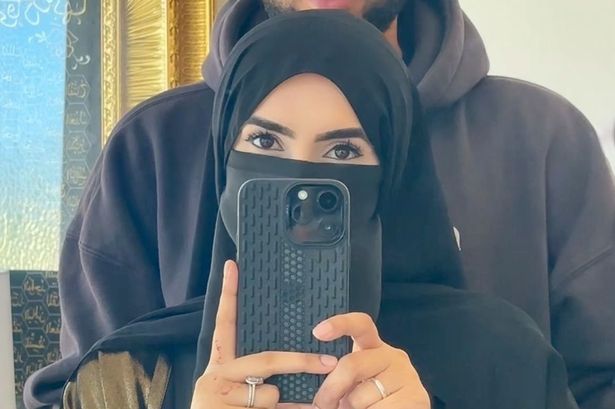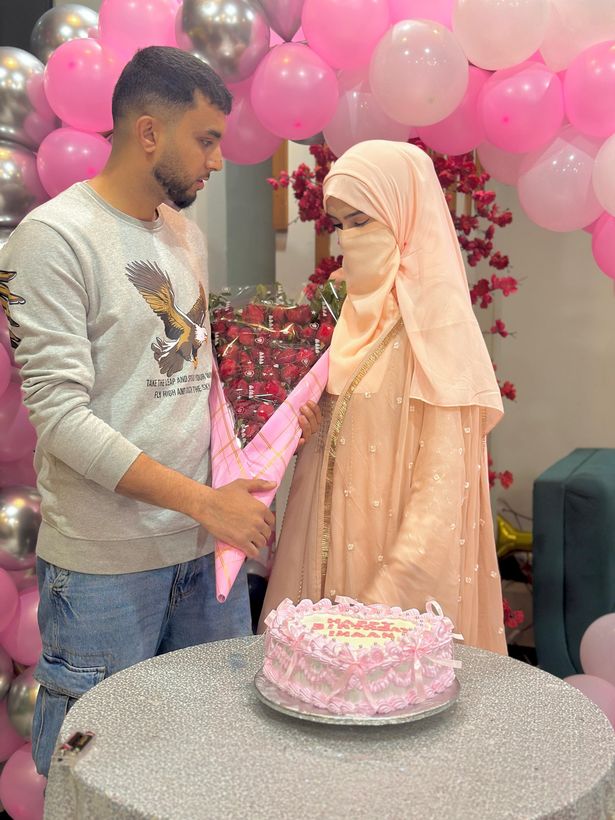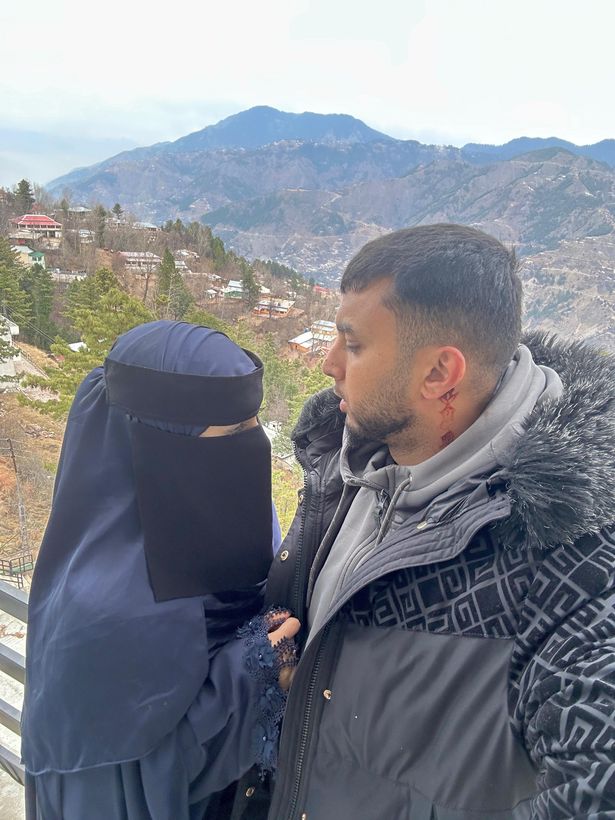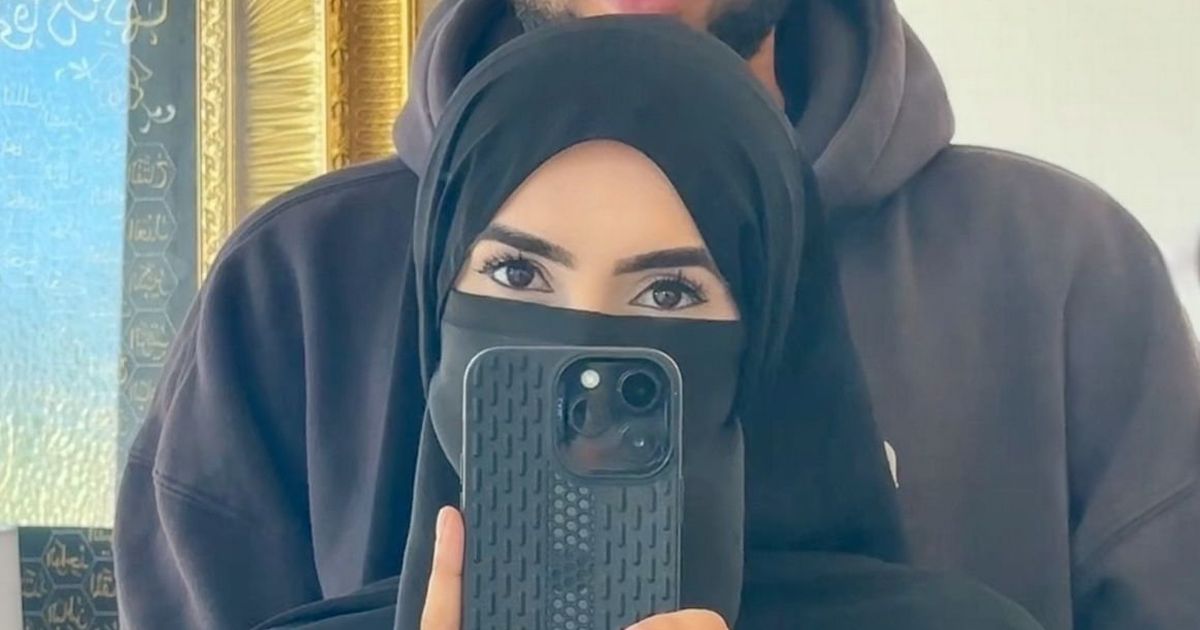The Liverpool Hope University student hopes to become a solicitor and said she feels comfortable wearing the niqab in the city Imaan Ahmed and her husband Bilal.
Imaan Ahmed and her husband Bilal.
A 23-year-old woman who started wearing a niqab two years ago says it’s “empowering” – even though she’s been told she looks like an “executioner” and a “liar”. Imaan Ahmed, a law student at Liverpool Hope University, grew up Muslim but wasn’t “close” to the religion until she went to Mecca in 2022. She started wearing the head and face covering, so people outside her home can only see her eyes.
Earlier this month Reform UK MP Sarah Pochin asked Keir Starmer if he planned to follow other European countries and prohibit burqas – and Kemi Badenoch called for bosses to be able to ban the garment in the workplace. Imaan said this step would be “taking away a woman’s right” and her choice should be accepted.
The niqab conceals the face but leaves the eyes uncovered while the burka is a full body covering. Imaan claims she was once told she “dresses like an executioner” – but she’s proud to cover her face. She said: “Younger people, they’re accepting of it because, you know, you’ve got LGBTQ, no-one’s the same anymore.
“So at university I’m really comfortable in it. But I get the train and it’s middle-aged people and older people you get funny looks from.
“I was in Manchester city centre one day with a friend and this guy, [a YouTuber] came up to us with this camera and he says, ‘What would you say to people who say you dress like executioners? You cover your face because you have something to hide, you’re a liar, he was saying.
“And I was just like, that’s the first time someone’s actually come and said something me. I didn’t say anything, we just walked away.
“It was on one of his YouTube videos. Someone sent it to me but I didn’t watch it.”
 Imaan Ahmed and her husband Bilal
Imaan Ahmed and her husband Bilal
Imaan said this experience was the exception. She said: “We’ve had some really nice interactions as well, from people saying, you look beautiful.
“It does feel nice when they say beautiful, because even though we cover our face, the girls might wear a nice colour, a pink hijab or a nice pattern. It’s nice when someone compliments you. The majority of British people have been nice, honestly.”
Imaan added: “If they do ban the burka, they’re really setting themselves back. Because you’re taking away a woman’s right. If someone chooses to cover or not cover, it should be their choice, not the government’s.
“A lot of people have the misconception that Muslim women cover themselves because of men, because they’re told to by their father or their brother. My mum doesn’t wear niqab or even hijab. My family’s very open-minded, it’s a choice I wanted to make, and the same with a lot of my friends.
“For me, it’s empowering. Before I wore this, I was just a regular young girl. I was always just really insecure, I followed trends. I looked at influencers and thought, oh my god, I’m not skinny enough.
“When I started wearing the face covering I felt more confident. It’s like, I don’t need to worry about anything, I don’t need to worry about, like, fitting in with society.
“There’s so much stigma around saying that all the people who wear this, someone’s told them to, they’re oppressed. Which, yeah, in some countries that’s the case for some women, but it’s a small percentage who that’s the case for. Most of us are doing it out of their own choice.
“They’re thinking they’re giving women more freedom by saying, don’t cover, but really you’re controlling us because you’re deciding how we dress. So it’s doing the opposite of what they think they’re doing.”
 Imaan Ahmed and her husband Bilal
Imaan Ahmed and her husband Bilal
She added: “As a teenager I didn’t wear anything, not even the head covering. I was born Muslim, but I was never really that close with the religion. Then in 2022 I went on Umrah, the pilgrimage you go to in Mecca.
“When I went to Mecca, a lot of Arab women wear it in Saudi Arabia and around there. And I literally just thought, oh my god, it looks so nice, because everyone was wearing it. I just bought it and wore it.
“When I came back to the UK I wore it some days, and then I had this attachment to it. I became closer to the religion after Umrah and I started wearing the headscarf. And then I just moved a step further.
“I’ve got a few Niqabi friends as well. I met them through social media. I posted, like, if any Niqabi people are living in the Manchester area, message me. And now we have this group.
“Some of the girls, their families wear them. Some they choose to themselves. And some people wear it on some days if they feel like it and some days they don’t, they aren’t that strict with it. In our religion it’s not an obligation to wear it. I wear it all the time now, but I didn’t used to.”
Imaan lives in Burnley, Lancashire, with her husband Bilal, and commutes into university. She didn’t wear the niqab when they met.
She said: “We’ve been together since very young, I was 15 and he was 16. We met on social media, typical.
“It wasn’t an arranged marriage as a lot of people expect it to be due to our young ages–we just both wanted to be together so we decided to get married.
“When we got married I was 18, he just turned 20. So we’ve been together for a long time now, but married five years in July.”
About her choice to don the face covering, she said: “I kind of wore it slowly, so it was never like, I wore it one day and he was like, woah. He doesn’t have a huge opinion towards it, because it’s just what I want to do.
“It really annoys me when people say we’re made to wear them. Since I started wearing it, even some of my family members who are Muslim have said, like, are you sure you really want to wear it? I’m the first person in my family to wear it.”
Imaan is in her first year studying law at Liverpool Hope University and hopes to be a solicitor one day.
